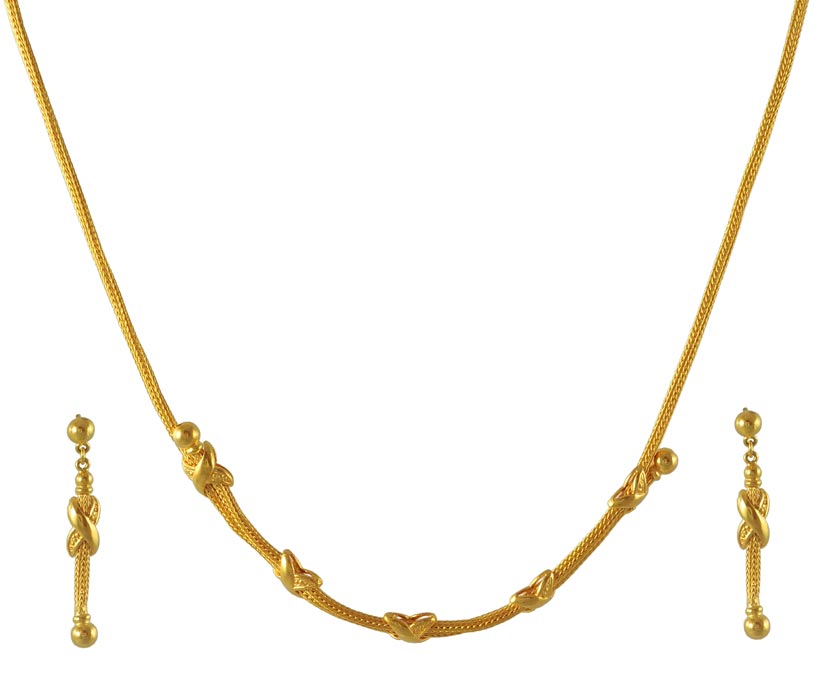22k Gold Indian Jewelry Biography
Source(google.com.pk)Gold is a metal that lures many. It gives the security against any
financial crisis, because of its easy liquidity, and is also used by women
for adorning themselves. Traditionally, gold has been considered
auspicious among Hindus and is regarded to be symbolic of Lakshmi,
the Goddess of Wealth. Gold is symbol of perfection, immortality and
prosperity; it is the substance that myths and legends are made of. It is
a favourite for making jewellery, for the reason that it is anti-rust and
has an everlasting shine.
Kancheepuram in southern India and Varanasi in northern India have
been the centre of gold jewellery making since the historic times. Gold
has been used in making of brocades and weaving. Zardozi, which was brought in India by Mughals, used gold
thread is in embroidery. An excellent craft, it is quite popular even today. Like other jewellery products, gold
jewellery is typical to the region. Design and pattern of gold jewellery differs according to the area and tradition
carried on historically.
Till date, there has been no historical evidence to shows that Indian women did not wear any gold jewellery
anytime. Earrings, nose rings, bracelets, armlets etc., all have been a part and parcel of the women in India,
historically. Indian gold jewellery got its international touch during Mughal period. The Mughals inspired Indian
craftsmen to learn intricacies and nuances of jewellery making. During this period enameling, embedding stones
in gold and filigree work attained great popularity.
During Mughal period, the gold jewellery of the hands and feet was extremely ornate. The reason was that
women wore veils and the only exposed parts of their body were their hands and feet. Some major gold jewellery
of India includes necklaces, nose rings, earrings, hair clips, waistbands or toe rings etc, all popular among Indian
women. Besides the fact that gold jewellery lures Indian women most for obvious reasons, gold is believed to
welcome Lakshmi. During Diwali, Goddess Lakshmi is worshiped and gold is almost invariably bought.
India and jewellery, jewellery and Indian women - the terms are linked
inherently. At the time of wedding as well as numerous other
occasions, a woman is gifted jewellery by her parents and relatives.
Although the gift is meant to give her security in contingency,
ornamentation is an obvious purpose. All the cities across the length
and width of India have shops of jewellers - some traditional and some
modern jewellers, catering to the need of all kinds. Not that the affluent
class people wear ornaments, there are low cost jewellery items in
ample, which cater the demand of low income group as well.
India houses various kinds of jewellery arts, ranging from Meenakari
and Kundan to stone and bead work. The craft of cutting and polishing precious and semi-precious stones and
giving them glamorous face is something artistic. Emeralds, rubies, garnets, amethysts, corals, sapphires, and
turquoises are among the stones which are used for the enhancement of gold and silver jewellery. Gold jewellery
is the most popular among South Indian women. In southern part of India, gold is considered auspicious and a
status symbol. Talking about the art on gold jewellery, Kundan is something that comes into our mind.
It is a Mughal-inspired art of setting precious stones like diamonds, rubies, and emeralds in gold and silver
jewellery. In Meenakari, enameling is done to protect gold and floral pattern coloured in red, blue and green
attracts the attention. Silver jewellery is not far behind in popularity, particularly because of its affordability,
making it popular among low income group people. Jhumka, hansli, chokar, nath and bracelets made of silver are
quite popular among women in India. In short, the range of jewellery in India is wide as well as varied. Be it gold,
silver of diamond, you will find everything in the country.
22k Gold Indian Jewelry Indian Jewelry Sets Bangles Rings Box Designs Band Designs Lates Gold Earnings Designs Ads Photos Images Pics
22k Gold Indian Jewelry Indian Jewelry Sets Bangles Rings Box Designs Band Designs Lates Gold Earnings Designs Ads Photos Images Pics
22k Gold Indian Jewelry Indian Jewelry Sets Bangles Rings Box Designs Band Designs Lates Gold Earnings Designs Ads Photos Images Pics
22k Gold Indian Jewelry Indian Jewelry Sets Bangles Rings Box Designs Band Designs Lates Gold Earnings Designs Ads Photos Images Pics
22k Gold Indian Jewelry Indian Jewelry Sets Bangles Rings Box Designs Band Designs Lates Gold Earnings Designs Ads Photos Images Pics
22k Gold Indian Jewelry Indian Jewelry Sets Bangles Rings Box Designs Band Designs Lates Gold Earnings Designs Ads Photos Images Pics
22k Gold Indian Jewelry Indian Jewelry Sets Bangles Rings Box Designs Band Designs Lates Gold Earnings Designs Ads Photos Images Pics
22k Gold Indian Jewelry Indian Jewelry Sets Bangles Rings Box Designs Band Designs Lates Gold Earnings Designs Ads Photos Images Pics

22k Gold Indian Jewelry Indian Jewelry Sets Bangles Rings Box Designs Band Designs Lates Gold Earnings Designs Ads Photos Images Pics
22k Gold Indian Jewelry Indian Jewelry Sets Bangles Rings Box Designs Band Designs Lates Gold Earnings Designs Ads Photos Images Pics

No comments:
Post a Comment